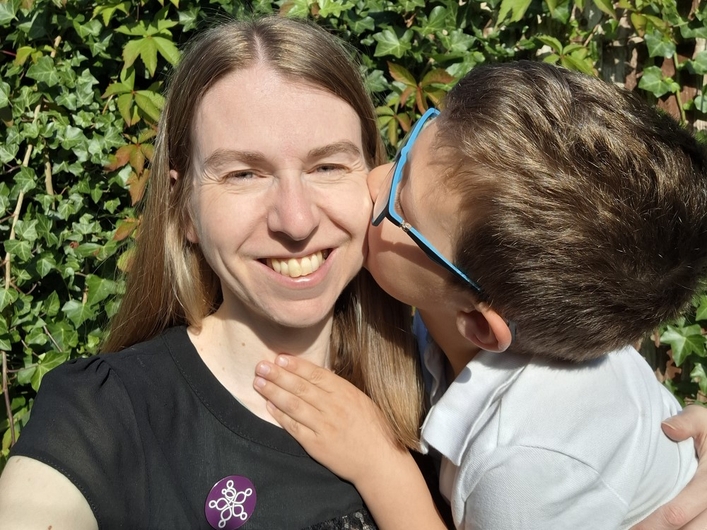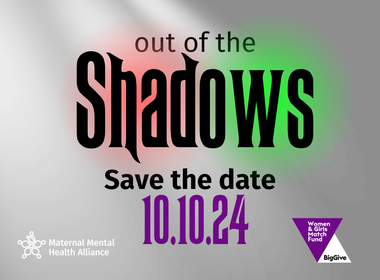Posted By: Amy Tubb
16th October 2024
6 minute read

When my husband and I were thinking about trying for a family, we were both very aware that we might struggle, both getting pregnant and with my mental health. This was due to my personal and also family history. Personally, I had a twenty-year history with a restrictive eating disorder and my weight was still quite low. I’d also had prolonged episodes of depression, with suicidal thoughts, and more recently received a bipolar diagnosis. In terms of family history, I knew that my mother had been very poorly after the birth of both my older brother and myself, resulting in inpatient psychiatric treatment each time.
Concerned about our risk factors for both conceiving and staying well during pregnancy and post-birth, we sought specialist medical advice throughout our journey. We had fertility tests, which came back encouraging apart from concern about my weight, and saw a specialist perinatal psychiatrist. The consultant confirmed my elevated risk for perinatal mental illness but said we would be supported throughout our journey. A specialist plan was provided when we did become pregnant, which involved monitoring throughout pregnancy, starting a precautionary antipsychotic medication when I gave birth, a private room post-birth in the maternity ward (to minimise sleep deprivation, a known risk factor with bipolar disorder), and ‘if the worst comes to the worst’, treatment in the Mother and Baby Unit (MBU). We were even offered a tour of the MBU so it would seem less daunting.
In reviews throughout pregnancy, no one had any major concerns. My mental health remained stable, and I absolutely loved being pregnant. The birth went very well, and indeed my first few weeks of being a mum were great. We passed the ‘three-day danger zone’, a timescale I had in my head based on when my mother’s mental health had deteriorated after each birth, and adjusted well to coming home from hospital. I felt proud of myself when I did things for the first time, like taking my baby out for a walk, or breastfeeding in public. We felt very bonded.
Things really started to fall apart three weeks post-birth, when my husband returned to work. I quickly became very anxious and worried. I think it was having sole responsibility for something so fragile and helpless. I was used to being in control of things, and so tried to make a plan for how to fill every minute of every day, and to be around other people as much as possible. But inevitably things didn’t go to plan. I couldn’t understand why my baby was crying, and felt I was failing by not being able to help him. I was begging my husband not to leave for work each morning. He tried to help by giving me lists of things to try to respond to the crying, etc. but even simple actions seemed overwhelming. I became more detached from my son. I was becoming scared of him. When specialist Health Visitors came to see us, I begged to be admitted to the MBU as I thought this would be a magic solution – not having sole responsibility any more, and professionals who could sort out my head.
I was becoming scared of him.
A bed soon became available and we were admitted, but my mental health continued to deteriorate. At first the ward Psychiatrist thought I had an attachment disorder, and so was encouraging me to do as much as possible for my son myself. But I was terrified of getting things wrong. I remember specific fears of not sterilising the bottles properly, or incorrectly logging down how much milk he was drinking. I started to hide as much as I could, like lingering in the kitchen area at meal-times, when the staff would be watching the babies. I was desperate to leave the ward, as I felt it wasn’t helping, but when I had some weekend leave, I would rely on my husband to do everything for our son, and knew I still needed specialist help. I felt completely useless to my son, completely trapped, and like there was no escape and no hope. Reflecting back, I think I was expecting certain manifestations or symptoms of mental illness at this time, based on what I had experienced before. So depression or even a manic episode (sleeplessness, rapid thoughts, elation), but what I mainly felt was increasing levels of fear, agitation, anxiety, uselessness and hopelessness.
It reached crisis point and I became too poorly to remain in the MBU. My son was sent home to my husband and I was transferred to another psychiatric ward. I was convinced I would never be allowed back home or allowed to be his mum. I guess this would be the ‘rock bottom’.
I was convinced I would never be allowed back home or allowed to be his mum.
During the following months in hospital, I only saw my son for visits, and on my baby’s first Christmas Day, we were not together. It was heartbreaking, and I just felt like I had let him down so much. Even when I was discharged from hospital and moved back into the family home, my husband had to do the bulk of the care-giving, holding my hand through things like feeds and baths. I was convinced that I would never have a proper bond with my son, and that my husband would decide they were better off without me.
So began the long road to recovery. I am so lucky that my husband remained an absolute rock for both our baby and myself throughout. I also had incredible support from my father, brother and close friends. My husband and I were also extremely fortunate with our employers – he had been able to take additional leave to accommodate our circumstances, and I had a wonderfully supportive senior colleague who checked in with me throughout my journey and advocated for me in the workplace. We made the decision that I would try to return to work earlier than I had planned, to see if that might help with my sense of routine and self-esteem. I met with my line manager and HR, and was able to bring my community mental health nurse with me. We agreed a supportive, phased return to work and this was really helpful for my recovery. I started to feel like a functioning person again. I had something to focus on apart from my perceived failure as a mother, and some more social interaction.
Over time, I slowly started to feel like my baby’s mum again. I can’t recall exactly when things shifted in my head, but I have a photo of us hugging on his second Christmas where I can see in my face the love, joy and bond that I feel now. It was only well into my recovery that I met other people who had been through similar things, via MMHA member Action on Postpartum Psychosis. That proved really helpful for sense-making and feeling less broken and alone.
I slowly started to feel like my baby’s mum again... I have a photo of us hugging on his second Christmas where I can see in my face the love, joy, and bond that I feel now.
As a work and employment researcher, with a background in Human Resource Management, I am currently focussing attention on the intersection between work and perinatal mental health journeys, and how we can make more workplaces supportive for people affected. I have also taken part in research studies on perinatal mental health and engaged in broader awareness raising. I am hugely honoured to be the first Ambassador for the amazing Maternal Mental Health Alliance.
Even though I wasn’t there for my baby at the start, we would go on to have the most incredible bond.
The MMHA would like to thank Krystal for sharing her story and helping us bring perinatal mental health Out of the Shadows.
If Krystal's words have inspired you to get involved, you can find out more below or:
Double your donation now
From October 10th to 17th, we’re taking part in our first-ever matched fundraising campaign with the Big Give. Together, let's bring perinatal mental health Out of the Shadows.

A seven-day online match funding campaign working with exceptional charities dedicated to serving the women and girls in our communities, fostering a future where every individual can thrive without limitations.